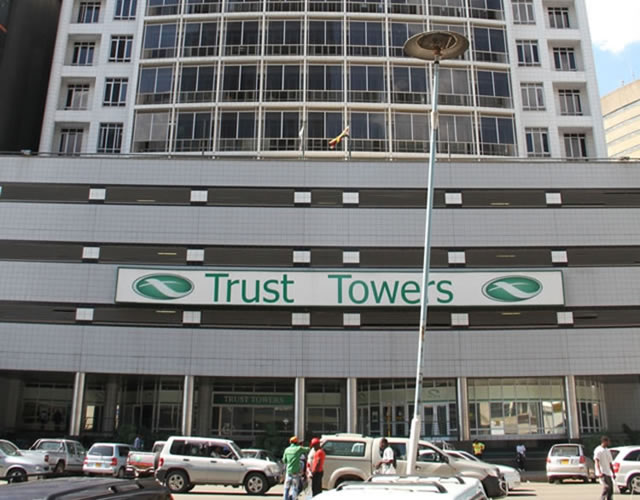What lies ahead in 2014?


Trust Bank is one of the casualties in the financial sector as it had its licence cancelled this month, with liquidation to follow
Linda Tsarwe Business Correspondent
Today marks the last day of 2013, drawing the curtains down on an eventful year. The major highlight for the country was the elections held in July, marking an end to the Government of National Unity. Now that the country is no longer in election mode, everyone is looking towards awakening the economy from its slumber.
Furthermore issues such as conflicting policies are expected to come to an end, and this will have the effect of improving the perception of the country as a safe investment destination.
The Government has a monumental task in addressing economic challenges that face the country in the New Year. The year 2013 has ended on an uncomfortable note.
Firstly, the liquidity crunch worsened during the last half of the year. There has been reported turmoil in the financial sector as some banks are short to the extent of failing to pay out depositors on demand.
Casualties have already been recorded in the sector as Trust Bank had its licence cancelled this month, with liquidation to follow.
For most companies, the liquidity crunch has been hindering financial performance, with many performing below budget.
Unfortunately the crisis will be carried forward into the New Year and an urgent antidote is crucial to curb it from perpetuating in 2014.
Consequently, the manufacturing sector struggled throughout the year.
According to the budget, capacity utilisation came down to 39,6 percent in 2013 from 44,9 percent in 2012. Most companies have failed to capitalise their operations due to failure to access capital.
Most companies are debt-ridden and are making perennial losses. Several reports have also shown that a number of companies have gone under, exacerbating the level of unemployment.
The country is still importing basic commodities, as the local industry cannot meet demand. As a result, the trade deficit continues to widen.
Amid all this economic chaos, inflation is actually on the decline. It opened the year at 2,5 percent and as at November 2013 it stood at 0,54 percent.
This is due to weak aggregate demand, as consumers have also been hit hard by the liquidity crunch. Many fear that the country is heading towards deflation, which will shrink the economy that is yet to catch up with its peers in the region, in terms of growth and development.
Government has, however, projected annual inflation of 1,5 percent for 2014 as demand is expected to improve in 2014. Despite all this, the Government is confident that the economy will almost double in growth next year.
They are projecting GDP growth of 6,1 percent in 2014 up from 3,4 percent estimated for 2013. Growth will be anchored on agriculture and mining. The two sectors are estimated to grow by 9 percent and 11,4 percent respectively in 2014.
This is an increase from a negative 1,3 percent estimated growth for agriculture for 2013 and 6,5 percent for mining. While these two sectors are major contributors to the country’s GDP, they remain prone to price sensitivities in their markets.
At the moment, commodity prices have been on the decline and the market predictions do not forecast any upswing in the short term.
Beneficiation is critical for the mining sector. However, facilities such as refineries which enable that to happen require significant capital outlays, which may not be available in the short term.
Manufacturing sector is also expected to contribute positively to GDP and is projected to grow by 3,2 percent from 1,5 percent estimated for 2013.
However, this growth is only achievable if the industry receives significant capital injection. For many years now, the sector has struggled to attract any significant capital, with only the likes of Delta having managed to capitalise after the economy dollarised.
The rest have been languishing in debt and obsolete machinery. A game changer is required to woo the right investors who will resuscitate the industry. Otherwise, capacity utilisation might plunge further, to pittance levels.
The financial sector, on the other hand, might get a relief should the US$100 million facility for interbank trading come through.
In addition, the capitalisation of the Reserve Bank of Zimbabwe will also capacitate it as the lender of last resort.
Both injections are expected around the first quarter of 2014. However, this is contingent on the funds coming through. If it does, it will relieve the constraints that banks are facing as far as making timely payments is concerned.
The solution is, however, short-term and banks require a steady and continuous flow of deposits to remain liquid. Promotion of foreign direct investment will be key to ensuring that this happens.
On overall, well-functioning industries will result in a smooth flow of money, which keeps all businesses going, including banks.
Failure for that to happen might see the same fate of Trust Bank befalling other banks, while some could be placed under curatorship or even voluntarily surrender their licences.
Theoretically, a shrinking cake will at some point kick other players out. Should this happen, a financial crisis may break out, which is undesirable as it disturbs the economy.
Given the odds, it would not be far-fetched that our 2014 GDP growth is too optimistic. Several fundamentals need to be revisited, if the 2014 forecasts are to be nearly achieved. Some of the measures were already detailed in the budget and execution is expected in the coming year.
However, many other issues remain unresolved. On the grassroots, the country requires capital inflow which will have a multiplier effect from revitalising industry to solving the liquidity crisis.
Unemployment is reduced as more companies become stronger and capacity increases. The trade deficit will start to narrow as other imports such as basic commodities will no longer be procured offshore.
It is paramount that the country pursues capital inflow in 2014, to derive value out of its key sectors and achieve its growth targets.
However, if this does not happen, then the nation might need to buckle up as it is likely to face a bumpy ride ahead.
The writer is primarily responsible for this article and certifies that the opinion on the subject or any other views expressed herein reflects the writer’s personal views. The writer has taken all reasonable steps to ensure that the information in the article is correct and no liability is accepted for any loss arising on reliance on it. All opinions and estimates expressed in this report are (unless otherwise indicated) entirely those of the writer.
Feedback: [email protected]











Comments